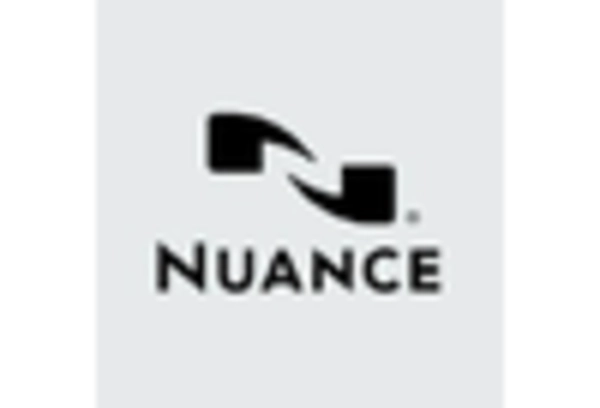Expansion of Remote Work Culture
The expansion of remote work culture in Japan is significantly influencing the ai speech-to-text-tool market. As more organizations adopt flexible work arrangements, the need for effective communication tools has become paramount. Speech-to-text technology is being utilized to facilitate virtual meetings, transcribe discussions, and enhance collaboration among remote teams. This shift is expected to contribute to a market growth of approximately 10% over the next few years. The ai speech-to-text-tool market is thus positioned to capitalize on this trend, as companies seek to improve productivity and streamline workflows in a remote working environment.
Technological Advancements in AI
Technological advancements in artificial intelligence are playing a crucial role in shaping the ai speech-to-text-tool market in Japan. Innovations in machine learning algorithms and natural language processing are enhancing the accuracy and efficiency of speech recognition systems. These improvements are not only making the tools more reliable but also expanding their applicability across various industries, including media, telecommunications, and customer service. The market is expected to witness a growth rate of around 12% annually, driven by these technological enhancements. As businesses increasingly adopt these advanced tools, the ai speech-to-text-tool market is likely to see a significant uptick in demand, reflecting the ongoing evolution of AI capabilities.
Growing Need for Real-time Communication
The growing need for real-time communication solutions is a significant driver for the ai speech-to-text-tool market in Japan. As businesses and individuals increasingly rely on instant communication methods, the demand for tools that can transcribe spoken language into text in real-time is rising. This is particularly relevant in sectors such as customer service and online education, where timely information exchange is critical. The market is anticipated to expand at a rate of approximately 11% as organizations seek to enhance their communication capabilities. The ai speech-to-text-tool market is likely to thrive in this environment, as the need for efficient and effective communication tools continues to escalate.
Rising Demand for Accessibility Solutions
The ai speech-to-text-tool market in Japan is experiencing a notable surge in demand for accessibility solutions. This trend is largely driven by the increasing awareness of the need for inclusivity in various sectors, including education and corporate environments. Organizations are recognizing the importance of providing equal access to information for individuals with disabilities. As a result, the market is projected to grow at a CAGR of approximately 15% over the next five years. This growth is indicative of a broader societal shift towards accommodating diverse needs, thereby enhancing the overall user experience. The ai speech-to-text-tool market is poised to benefit significantly from this rising demand, as more companies invest in technologies that facilitate communication and comprehension for all users.
Increased Investment in Digital Transformation
Increased investment in digital transformation initiatives across various sectors in Japan is driving the ai speech-to-text-tool market. Organizations are prioritizing the integration of advanced technologies to enhance operational efficiency and customer engagement. This trend is particularly evident in industries such as finance, retail, and education, where companies are leveraging speech-to-text tools to automate processes and improve service delivery. The market is projected to grow by around 14% as businesses recognize the value of these tools in their digital strategies. The ai speech-to-text-tool market stands to gain from this influx of investment, as more enterprises adopt these technologies to stay competitive.
















